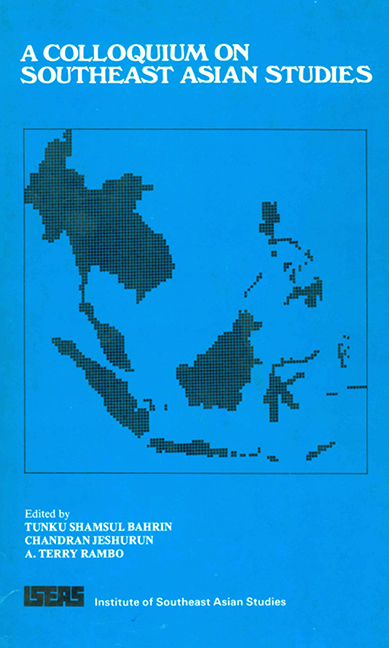Book contents
- Frontmatter
- Contents
- Foreword
- Preface
- Acknowledgements
- Introduction
- Contributors
- PART I TEACHING AND RESEARCH
- THE CONCEPTUAL THEORIES
- 1 Southeast Asian Studies: Problems and Potentialities — East and West
- 2 Southeast Asian Studies: Some Unresolved Problems
- 3 The Challenge of Diversity: Southeast Asian Studies and the Development of Social Science
- THE EXTRAREGIONAL EXPERIENCE
- THE REGIONAL PERSPECTIVE
- THE PROBLEMS OF TEACHING AND RESEARCH
- PART II ENVIRONMENT AND DEVELOPMENT
1 - Southeast Asian Studies: Problems and Potentialities — East and West
from THE CONCEPTUAL THEORIES
Published online by Cambridge University Press: 21 October 2015
- Frontmatter
- Contents
- Foreword
- Preface
- Acknowledgements
- Introduction
- Contributors
- PART I TEACHING AND RESEARCH
- THE CONCEPTUAL THEORIES
- 1 Southeast Asian Studies: Problems and Potentialities — East and West
- 2 Southeast Asian Studies: Some Unresolved Problems
- 3 The Challenge of Diversity: Southeast Asian Studies and the Development of Social Science
- THE EXTRAREGIONAL EXPERIENCE
- THE REGIONAL PERSPECTIVE
- THE PROBLEMS OF TEACHING AND RESEARCH
- PART II ENVIRONMENT AND DEVELOPMENT
Summary
Since the end of the American-Vietnamese war, most Southeast Asian nations have become more seriously concerned about improving international communications and collaboration among themselves than ever before. The several formal regional cooperative arrangements organized by their governments to deal with a variety of common area problems have now taken on a new life. At the same time, as regards higher education, officials of the governments and universities of these countries appear to show little, or at best, uneven concern for the organization and development of scholarly resources for research and instruction in the field of Southeast Asian regional studies.
It is in this context of regional as well as national development that this conference has been organized to consider the problems and the potentialities of Southeast Asian area studies in Southeast Asia. At their best, what can such studies contribute to the increased stature and strength of each nation and of the region as a whole? What is “their best”? How can this best be established and maintained, and in how many institutions, when there are so many competing academic and research needs crying for development and so few human and material resources at hand to still these cries?
First, area programmes as such will be considered and then attention will be turned to some of the difficulties experienced in the West in organizing and developing area programmes. Finally, it will be necessary to look with as little bias as possible at the Southeast Asian Studies programme which would support training and research on the area, in the area, by area scholars. The multidisciplinary study of a region, the area programme, is not a new thing in the history of mankind's conscious efforts to understand better the world in which he lives. Neither Greeks nor Chinese lumped together all the Barbarians or Man Ren beyond their borders; rather, they sought to distinguish and thus in a sense to understand Skythians and Ethiopians, Hiung Nu and Lolo. But their interest in such foreigners was immediate, practical, highly empirical, and short-lived.
- Type
- Chapter
- Information
- A Colloquium on Southeast Asian Studies , pp. 3 - 14Publisher: ISEAS–Yusof Ishak InstitutePrint publication year: 1981

